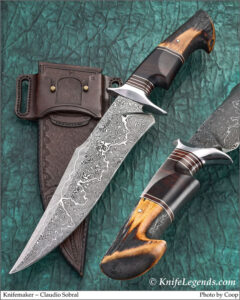In the world of custom knives, authenticity is key. Whether you’re a seasoned collector or a first-time buyer, understanding how to authenticate a rare custom knife ensures you’re investing in a piece that holds true value. With the rise in popularity of custom knives, the market has unfortunately seen a growth in counterfeit or misrepresented knives. To help you avoid falling for these, here’s a guide on how to authenticate a rare custom knife and make informed purchases.
1. Research the Maker’s Signature or Mark
One of the most important steps in authenticating a custom knife is identifying the maker’s signature or mark. Most reputable knife makers will engrave or stencil their logo, signature, or a distinct symbol on the blade, tang, or handle. These marks can vary in style and placement depending on the maker. Research the specific mark of the knife maker whose work you’re examining to see if it matches known authentic examples.
- Consistency: A genuine mark will be consistent across all knives made by that particular artisan. If the mark looks different from other knives you’ve seen by the same maker, it could be a fake.
- Location: Pay attention to where the mark is located. Some makers place their mark on the blade’s spine, while others might etch it on the tang (the part of the blade that extends into the handle). Some makers stamp the inside of the backspring.
2. Assess the Materials Used
Custom knives are known for their premium materials, whether in the blade, handle, or fittings. Counterfeit knives or low-quality replicas often use inferior materials. Here are some things to check for:
- Blade Steel: High-quality custom knives typically use premium steels like D2, ATS-34, RWL-34, , BG-42, CPM-S30V, VG-10, or Damascus. If the knife uses lower-grade steel or doesn’t specify the steel at all, it could be a red flag.
- Handle Materials: Custom knives often feature unique, high-end materials such as Fossil Mammoth, Gem Quality Stones, Various Color Pear, stabilized wood, carbon fiber, or exotic animal bone. A handle made from plastic or other cheap materials can be a sign of inauthenticity, with the exception of Micarta.
- Finish and Texture: Examine the finish closely. Authentic custom knives are meticulously crafted, with smooth, consistent finishes. Rough edges, poor polishing, polishing marks, or uneven texture could indicate a knock-off.
3. Examine the Construction and Craftsmanship
The craftsmanship of a rare custom knife should be impeccable. A well-made knife will exhibit precision in its construction, including:
- Symmetry and Fit: Check that the blade is centered in the handle of folding knives when in the closed position and the tang fits seamlessly into the handle without any gaps or misalignment. If the knife appears “off,” it may not be authentic.
- Smooth Action: For folding knives, the blade should open and close smoothly with minimal resistance, indicating quality craftsmanship. The lock mechanism should engage securely. And once locket, there should be no movement of the blade.
- No Visible Mistakes: Look for signs of rough work, like uneven grinding marks, sloppy edge beveling, or unpolished areas. High-quality custom knives are free of visible mistakes and show attention to detail in every aspect.
4. Check for Provenance or Documentation
Many rare and custom knives come with documentation or certificates of authenticity that outline the maker, materials, and other key details about the knife. Provenance is crucial when buying high-end knives, especially from well-known makers. Look for:
- Original Packaging: If the knife came with original packaging, like a box or cloth, check for details that align with the maker’s typical presentation.
- Certificate of Authenticity: Some high-value custom knives come with a certificate of authenticity that includes the maker’s signature and details about the knife’s production.
- Provenance History: For antique or rare knives, a clear ownership history or receipt of purchase can help verify authenticity.
5. Consult an Expert
When in doubt, consulting an expert in the field of custom knives can be invaluable. Knife experts can spot subtle signs of authenticity that the average person might miss. Whether it’s an appraiser, a renowned collector, or a specialized dealer such as KnifeLegends, getting a second opinion can help you feel confident in your purchase.
6. Use Online Resources and Communities
The online knife community can be a great resource when verifying a rare custom knife. Websites, forums, and social media groups dedicated to knife collecting often have members who are knowledgeable about specific makers and their work. You can ask for advice, share pictures, and get feedback from others who may have firsthand experience with the knife you’re considering.
When to Contact KnifeLegends
If you’re unsure about the authenticity of a rare custom knife or are looking for expert advice, KnifeLegends is the trusted source you need. With a focus on offering high-quality, authenticated custom knives from top makers, KnifeLegends guarantees that every knife in its collection meets the highest standards of craftsmanship and authenticity. Whether you’re purchasing a rare collector’s item or an everyday carry knife, KnifeLegends can help you find genuine pieces backed by decades of experience. Contact KnifeLegends today for guidance in building or expanding your knife collection with authentic, valuable custom knives.



